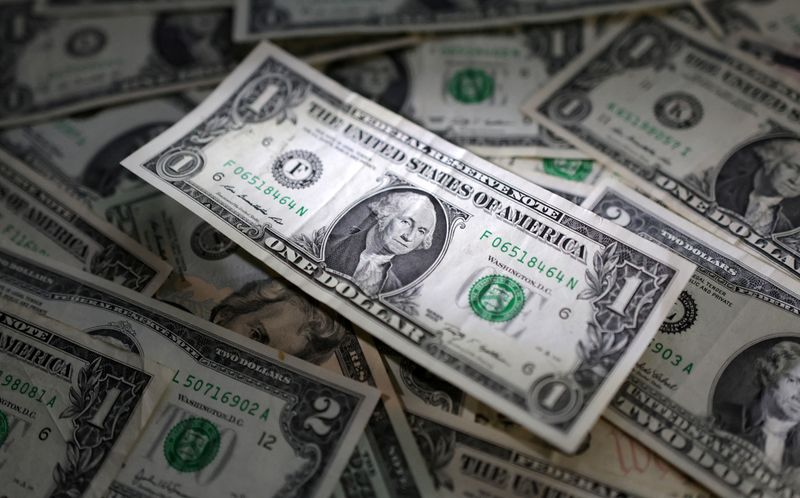(Corrects erroneous percent change in paragraph 7)
By Alden Bentley, Medha Singh and Wayne Cole
NEW YORK (Reuters) - The dollar backpedaled from two-year highs on Monday, while U.S. Treasury markets cheered Donald Trump's pick of hedge fund manager Scott Bessent for the U.S. Treasury secretary, trusting he will be more fiscally disciplined than investors had been fearing.
The Treasuries' rally in response to President-elect Trump's Bessent announcement late on Friday pushed yields on 10-year Treasuries down about 14 basis points, the most since early August. Two-year yields also tumbled, reducing the dollar's interest rate advantage.
The euro rose 0.83% to $1.0503, recovering from a fall on Friday to its lowest price against the dollar since Nov. 30, 2022. Against the Japanese yen, the dollar weakened 0.37% to 154.16 yen.
Traders see Bessent as old Wall Street hand and fiscal conservative. However, he has also openly favoured a strong dollar and supported tariffs, suggesting any pullback in the currency might be fleeting.
"I think it's an exaggerated response. We still don't know how much power is going to be in the White House and how much power is gonna be given to the cabinet," said Marc Chandler, chief market strategist at Bannockburn Global Forex in New York.
"I don't think we really know that much that we didn't know on Friday. I think it says more about market positioning than it does about the policies of the new administration," Chandler added.
The dollar index measuring the greenback against a basket of six other currencies, including the yen and the euro, fell 0.61% to 106.83, which was more than 1% below a two-year high set on Friday.
Trading was thin ahead of Thursday's U.S. Thanksgiving holiday, and Friday, which many market professionals also take off. The only major data on tap this week is on Wednesday, with the second reading of third quarter U.S. GDP and the October Personal Consumption Expenditures price index.
The greenback has risen for eight consecutive weeks with many technical indicators flashing overbought on bets Trump's policies would stoke inflation and further support the dollar.
"Pricing in various U.S. assets was pushed quite aggressively in one direction for three weeks," said Geoff Yu, senior macro strategist at BNY. "Markets probably need to take a breather when it comes to their dollar positions."
RATE OUTLOOKS DIVERGE
The euro zone's single currency had taken a hit on Friday as European manufacturing surveys (PMI) showed broad weakness, while U.S. surveys surprised on the high side.
The contrast saw European bond yields fall sharply, widening the gap with Treasury yields to the benefit of the dollar. Markets also priced in more aggressive easing from the European Central Bank, with the probability of a half-point rate cut in December rising to about 40%.
At the same time, futures scaled back the chance of a quarter-point rate cut from the Federal Reserve in December to 54%, from 75% a month ago, according to CME Group's (NASDAQ:CME) Fed Watch Tool.
Markets now imply about 150 basis points of ECB easing by the end of next year, compared with around 75 basis points from the Fed.
Minutes of the Fed's last meeting are due on Tuesday and will offer more clues on the U.S. central bank's thinking behind policy moves so far.
Also due this week are figures on U.S. and EU inflation, which will further refine the outlook for rates.
Sterling strengthened 0.33% to $1.2572 after hitting a six-week low on Friday at $1.2484.
In other North American currencies, the Mexican peso < MXN=> strengthened 0.87% versus the dollar to 20.272, while the Canadian dollar weakened 0.01% to 1.4 per U.S. dollar.
The Chinese yuan strengthened 0.22% against the greenback to 7.245 per dollar.

Turning to the crypto world, bitcoin was trading at $94,749.00, almost 5% below late Friday's level in consolidation of last week's run up to a record high of $99,830.
Bitcoin met profit taking ahead of the symbolic $100,000 barrier on Friday, having climbed more than 40% since the U.S. election earlier this month on expectations Trump will loosen the regulatory environment for cryptocurrencies. (This story has been refiled to rectify an erroneous percent change in paragraph 7)